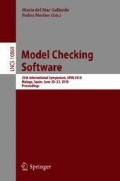Abstract
Systems and software with time dependent behavior are often formally specified using timed automata. For practical real-time systems, these specifications typically contain discrete data variables with nontrivial data flow besides real-valued clock variables. In this paper, we propose a lazy abstraction method for the location reachability problem of timed automata that can be used to efficiently control the visibility of discrete variables occurring in such specifications, this way alleviating state space explosion. The proposed abstraction refinement strategy is based on interpolation for variable assignments and symbolic backward search. We combine in a single algorithm our abstraction method with known efficient lazy abstraction algorithms for the handling of clock variables. Our experiments show that the proposed method performs favorably when compared to other lazy methods, and is suitable to significantly reduce the number of states generated during state space exploration.
T. Tóth—This work was partially supported by Gedeon Richter’s Talentum Foundation (Gyömrői út 19-21, 1103 Budapest, Hungary).
Access this chapter
Tax calculation will be finalised at checkout
Purchases are for personal use only
References
Alur, R., Dill, D.L.: A theory of timed automata. Theoret. Comput. Sci. 126(2), 183–235 (1994). https://doi.org/10.1016/0304-3975(94)90010-8
Behrmann, G., Bouyer, P., Fleury, E., Larsen, K.G.: Static guard analysis in timed automata verification. In: Garavel, H., Hatcliff, J. (eds.) TACAS 2003. LNCS, vol. 2619, pp. 254–270. Springer, Heidelberg (2003). https://doi.org/10.1007/3-540-36577-X_18
Behrmann, G., Bouyer, P., Larsen, K.G., Pelánek, R.: Lower and upper bounds in zone based abstractions of timed automata. In: Jensen, K., Podelski, A. (eds.) TACAS 2004. LNCS, vol. 2988, pp. 312–326. Springer, Heidelberg (2004). https://doi.org/10.1007/978-3-540-24730-2_25
Beyer, D., Löwe, S.: Explicit-state software model checking based on CEGAR and interpolation. In: Cortellessa, V., Varró, D. (eds.) FASE 2013. LNCS, vol. 7793, pp. 146–162. Springer, Heidelberg (2013). https://doi.org/10.1007/978-3-642-37057-1_11
Carioni, A., Ghilardi, S., Ranise, S.: MCMT in the land of parametrized timed automata. In: 6th International Verification Workshop (VERIFY-2010), pp. 47–64 (2010)
Clarke, E., Grumberg, O., Jha, S., Lu, Y., Veith, H.: Counterexample-guided abstraction refinement for symbolic model checking. J. ACM 50(5), 752–794 (2003). https://doi.org/10.1145/876638.876643
Daws, C., Tripakis, S.: Model checking of real-time reachability properties using abstractions. In: Steffen, B. (ed.) TACAS 1998. LNCS, vol. 1384, pp. 313–329. Springer, Heidelberg (1998). https://doi.org/10.1007/BFb0054180
Dierks, H., Kupferschmid, S., Larsen, K.G.: Automatic abstraction refinement for timed automata. In: Raskin, J.-F., Thiagarajan, P.S. (eds.) FORMATS 2007. LNCS, vol. 4763, pp. 114–129. Springer, Heidelberg (2007). https://doi.org/10.1007/978-3-540-75454-1_10
Henzinger, T.A., Jhala, R., Majumdar, R., Sutre, G.: Lazy abstraction. In: Principles of Programming Languages, pp. 58–70. ACM (2002). https://doi.org/10.1145/503272.503279
Herbreteau, F., Srivathsan, B., Walukiewicz, I.: Lazy abstractions for timed automata. In: Sharygina, N., Veith, H. (eds.) CAV 2013. LNCS, vol. 8044, pp. 990–1005. Springer, Heidelberg (2013). https://doi.org/10.1007/978-3-642-39799-8_71
Herbreteau, F., Kini, D., Srivathsan, B., Walukiewicz, I.: Using non-convex approximations for efficient analysis of timed automata. In: Foundations of Software Technology and Theoretical Computer Science. LIPIcs, vol. 13, pp. 78–89 (2011). https://doi.org/10.4230/LIPIcs.FSTTCS.2011.78
Herbreteau, F., Srivathsan, B., Walukiewicz, I.: Better abstractions for timed automata. In: Logic in Computer Science, pp. 375–384. IEEE (2012). https://doi.org/10.1109/LICS.2012.48
Hojjat, H., Rümmer, P., Subotic, P., Yi, W.: Horn clauses for communicating timed systems. In: Horn Clauses for Verification and Synthesis. EPTCS, vol. 169, pp. 39–52. Open Publishing Association (2014). https://doi.org/10.4204/EPTCS.169.6
Isenberg, T., Wehrheim, H.: Timed automata verification via IC3 with zones. In: Merz, S., Pang, J. (eds.) ICFEM 2014. LNCS, vol. 8829, pp. 203–218. Springer, Cham (2014). https://doi.org/10.1007/978-3-319-11737-9_14
Kindermann, R., Junttila, T., Niemelä, I.: SMT-based induction methods for timed systems. In: Jurdziński, M., Ničković, D. (eds.) FORMATS 2012. LNCS, vol. 7595, pp. 171–187. Springer, Heidelberg (2012). https://doi.org/10.1007/978-3-642-33365-1_13
Lugiez, D., Niebert, P., Zennou, S.: A partial order semantics approach to the clock explosion problem of timed automata. In: Jensen, K., Podelski, A. (eds.) TACAS 2004. LNCS, vol. 2988, pp. 296–311. Springer, Heidelberg (2004). https://doi.org/10.1007/978-3-540-24730-2_24
Morbé, G., Pigorsch, F., Scholl, C.: Fully symbolic model checking for timed automata. In: Gopalakrishnan, G., Qadeer, S. (eds.) CAV 2011. LNCS, vol. 6806, pp. 616–632. Springer, Heidelberg (2011). https://doi.org/10.1007/978-3-642-22110-1_50
Tóth, T., Hajdu, Á., Vörös, A., Micskei, Z., Majzik, I.: Theta: a framework for abstraction refinement-based model checking. In: Formal Methods in Computer Aided Design, pp. 176–179. FMCAD Inc. (2017). https://doi.org/10.23919/FMCAD.2017.8102257
Tóth, T., Majzik, I.: Lazy reachability checking for timed automata using interpolants. In: Abate, A., Geeraerts, G. (eds.) FORMATS 2017. LNCS, vol. 10419, pp. 264–280. Springer, Cham (2017). https://doi.org/10.1007/978-3-319-65765-3_15
Wang, W., Jiao, L.: Difference bound constraint abstraction for timed automata reachability checking. In: Graf, S., Viswanathan, M. (eds.) FORTE 2015. LNCS, vol. 9039, pp. 146–160. Springer, Cham (2015). https://doi.org/10.1007/978-3-319-19195-9_10
Author information
Authors and Affiliations
Corresponding author
Editor information
Editors and Affiliations
Rights and permissions
Copyright information
© 2018 Springer International Publishing AG, part of Springer Nature
About this paper
Cite this paper
Tóth, T., Majzik, I. (2018). Lazy Reachability Checking for Timed Automata with Discrete Variables. In: Gallardo, M., Merino, P. (eds) Model Checking Software. SPIN 2018. Lecture Notes in Computer Science(), vol 10869. Springer, Cham. https://doi.org/10.1007/978-3-319-94111-0_14
Download citation
DOI: https://doi.org/10.1007/978-3-319-94111-0_14
Published:
Publisher Name: Springer, Cham
Print ISBN: 978-3-319-94110-3
Online ISBN: 978-3-319-94111-0
eBook Packages: Computer ScienceComputer Science (R0)

